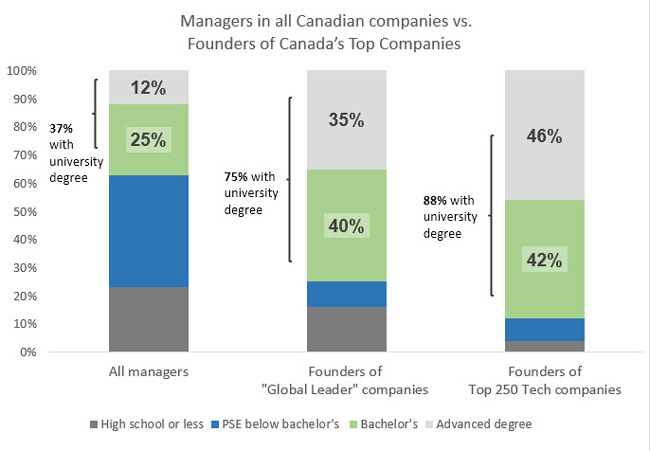Picture a successful entrepreneur. How did she get her start? How much education does he have?
Chances are probably good that you pictured a university dropout, creating something revolutionary in a garage or basement, à la Mark Zuckerberg or Bill Gates. (That’s the stereotype that comes to my mind, anyway; kudos to anyone who thought beyond the ordinary.)
If you look at the stats, rather than the stereotype, you’ll see a very different picture. Here’s a round-up of some different sources on entrepreneurship and education:
- The Global Entrepreneurship Monitor (GEM) of the World Economic Forum looks at early-stage entrepreneurship activity, which includes people who have taken concrete steps to start a business, plus those who have newly launched one. What educational level has the highest percentage of entrepreneurs? Graduate degrees.
- “The more education business owners have, the less likely they are to have to close a business,” according to the Institute for Competitiveness and Prosperity. Their 2012 report also shows that founders of Canada’s top companies are significantly more educated than the average manager. Nearly 90 per cent of the Top 250 Tech Companies have a university degree, with almost half holding graduate degrees.
A 2010 report from the Fondation de l’entrepreneurship also found that university graduates were far more likely to be successful business owners.
I remember reading about Bill Gates’s story in Malcolm Gladwell’s Outliers. Gates and Zuckerberg didn’t complete university, but they came from well-educated families, attended private schools, and had opportunities during high school that most people can only dream of. When Zuckerberg was a teenager, still in high school, his parents hired a computer tutor for him. He took graduate courses at a nearby college. Gates had access to a next-gen computer (next gen for the early 1970s, anyway) that allowed him to learn programming.
Their privileged background doesn’t take anything away from them; the obsession that drove them to spend thousands of hours working with computers was likely the biggest factor in their success. My point is that they are hardly your typical case.
You can’t really say “The best entrepreneurs are university dropouts: look at Gates and Zuckerberg.” You can state (and I hope more people will), “The most successful entrepreneurs hold a graduate degree.”
Sue Murley is Senior Director, Strategic Communications and Planning at McGill and holds a PhD in English Literature. This post reflects her personal opinions, not the official position of McGill University.
Related stories
Incomes of young university and college graduates: Part II
What recent graduates make – by field of study
Canada: We’re Number (Twenty-) One!
Do international students stay?



![Fondation-entrepreneur-2010[1]](https://reporter.mcgill.ca/wp-content/uploads/2016/01/Fondation-entrepreneur-20101.jpg)